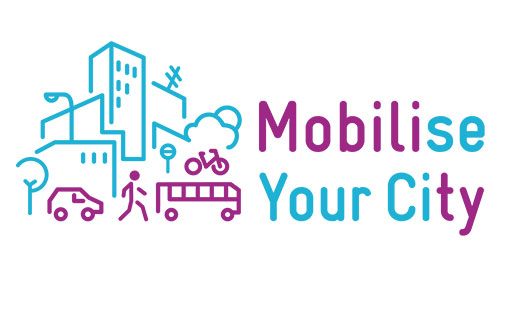MobiliseYourCity Morocco: 13 cities trained in monitoring and evaluating greenhouse gas emissions from urban transport
Morocco, which aims to reduce its total greenhouse gas emissions by at least 17%, has also pledged to reduce total emissions in the transport sector by 9.5% (i.e. 50 million tonnes of CO2). Worldwide, this sector generates over a quarter of CO2 emissions from fossil fuel combustion and urban transport causes almost half of these emissions. To address this challenge, the MYC Initiative supports cities and partner countries – including Morocco – for sustainable and low carbon urban mobility policies.
 Mobilise Your City
Mobilise Your City
A network to exchange, share, train and raise awareness
In Morocco, MobiliseYourCity works on capacity building actions, promotes exchanges between the national and local authorities and experience-sharing between cities, disseminates methodological tools and raises the awareness of local decision-makers about transport-climate issues. This all involves training sessions.
Some forty partners and members of the MYC Club of Cities attended the training session in February on monitoring and evaluation methods for GHG emissions from urban transport.
Improving the monitoring and evaluation of GHG emissions from urban transport
The training was for territorial officials responsible for urban mobility and the environment and was based on three modules, during which several Moroccan cities involved were able to share their experience:
- Presentation of climate finance mechanisms
It was pointed out that the implementation of a GHG monitoring-evaluation mechanism (measurement-reporting-verification, or MRV) was an eligibility criterion for this type of financing.
The City of Marrakech shared its experience in obtaining financing from international organisations (such as the Global Environment Facility) for the implementation of sustainable mobility actions.
- Raising awareness of the link between urban mobility and air quality
It was demonstrated that sectoral strategies to improve air quality and strategies to reduce GHGs had more positive impacts when they were included together in urban planning approaches.
The City of Agadir subsequently presented the actions implemented in the context of its Urban Development Plan, where the participatory approach is one of the priorities.
- Feedback on experience in MRV-GHG inventories to facilitate decision-making
The Secretary of State for Sustainable Development presented the National GHG Inventory System in Morocco and its achievements and prospects. I Care&Consult presented the TRIGGER tool developed by GIZ and IFEU, a reference method used for MRV-GHG in cities involved in MYC worldwide. The various cities will subsequently be trained in how to use the version adapted to the context of Morocco.
CEREMA also presented to the participants a method for the “energy diagnostic of mobility emissions” that makes it possible to conduct an assessment before the development of a mobility plan and propose effective actions which are better accepted when they are based on an understanding of the real mobility needs of the population.
Finally, the City of Oujda presented its sustainable energy strategy: its objective for 2020 is to reduce its CO2 emissions by 20%, all sectors taken together. The Municipality of Oujda has developed cooperation actions with Lille, Dakar and Antirabe and is supported by various programmes and partners in addition to MYC. It sets an example for the other Moroccan cities that are members of the initiative.
During the following days, the specific support was continued for the 3 pilot cities (Oujda, Rabat-Salé-Temara, Greater Casablanca) to train territorial officials in how to use the TRIGGER tool.
This training was organised by the Directorate General of Local Authorities of the Moroccan Ministry of the Interior, the MYC Partnership, the French Environment and Energy Management Agency (ADEME), Cerema and the consulting firm I Care & Consult. Julie Lucas, an expert in urban planning and urban mobility mobilised by Expertise France with financing from Agence Française de Développement (AFD), participated in the organisation of this training as the focal point of the MYC Initiative in Morocco.


